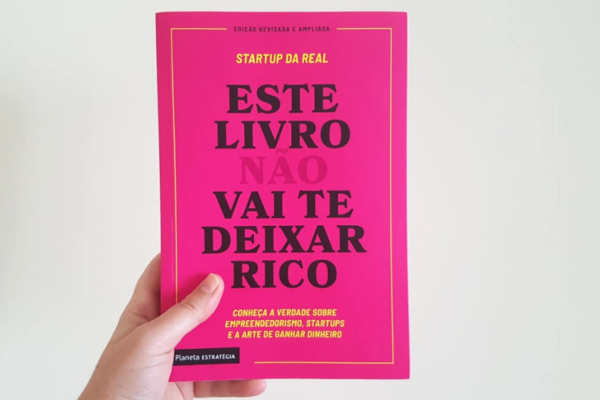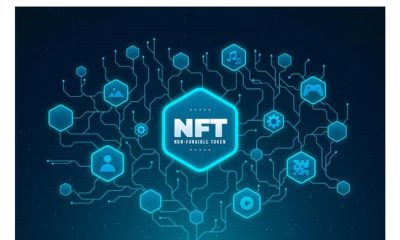
This book won't make you rich – so why read it? » Insights Portal
Follow Us @
This book won't make you rich – so why read it? » Insights Portal
-Trending Marketing news, content marketing, latest Ways to rank your website, marketing discoveries, Local SEO, seo and social media marketing services. enjoy your stay on our website.
If you decided to dedicate time to LinkedIn and Twitter during this pandemic, even more than before, you may have already come across some expressions that the public on these platforms invented for those who get the worst of workaholism, especially in the technology and finance. We are talking about the “Faria Limers”, largely responsible (but not the only ones) for making LinkedIn become a “fanfic platform”.
The expression Faria Limer aims to “box” the profile of those who work on Avenida Brigadeiro Faria Lima, the main financial center in São Paulo. The term illustrates the smart guy who thinks he is a master in finance and could even be the star of Wall Street.
The term fanfic for LinkedIn represents a criticism of the professional platform's exposure model. In it, most users paint their professional trajectory as brilliant and flawless, where the tips for success are basically focused on motivation and hard work. In other words, a piece of fiction. Of course, every job has flaws – and motivation and hard work are not always enough to win.
Where do we want to go with all this? Simple: this type of cyber-social behavior ended up giving rise to a series of fun parodies that tell “the truth” about markets considered innovative and relaxed. One of the most famous appeared on Twitter as @startupdareal and ended up becoming a book.
That's what we want to get to.
A work that won't make you rich
The promise is even in the title: This book won't make you rich is a compilation of reflections on startup culture and the lies (or, at least, not-so-pretty truths) behind the office with a ball pit.
We don't know who the author is, since the work is signed by the pseudonym @startupdareal. However, we close the book as if it were a chat between friends. Whoever wrote it talks about their professional trajectory – both the one that is generally exposed on the internet, with a focus on achievements, and the one that we don't go around talking about, with the setbacks and everything that went wrong until, finally, it came to fruition. right.
To show authority on the subject, the writer lists his privileges and says that he is not just a “hater” who hates professional fanfics or “startup founders”. Among the many experiences he had in this area, one of them was taking a course abroad on entrepreneurship. There, he heard a speech a little different from what he believes had spread here.
According to him, in Brazil it is very common to see influencers appealing to the inexorable desire to undertake and become rich, whereas, in reality, there are more variables in this equation:
– Making a financial reserve is important to avoid going hungry until your business takes off;
– The desire to undertake must be closely linked to what you want in life, as it will demand a lot from you in return;
– Contrary to what many people preach, there is no security and stability in entrepreneurship; on the contrary: entrepreneurship is entering a pool of risks;
– Entrepreneurship will not make you rich.
Of course there are exceptions, but they are just that: exceptions. With real data, the author shows that, at least in Brazil, the costs of a new company, between fixed and variable, will rarely give a professional a mountain of money. Often, he will earn even less than he earned when he was employed under the CLT regime.
Precisely for this reason it is important to see your own business as a strong reason to continue with it, what many call “purpose”. After all, in addition to not making you rich, it will potentially cause you suffering, headaches and adversity.
So is it better not to undertake?
Not necessarily – and that's the beauty of This Book Won't Make You Rich. The author does not want to convince you that life in startups is not worth it, or that having a formal contract is the best thing that can exist. He just wants to demonstrate, with data and facts, that entrepreneurship is not for everyone – and it's not even close to being as easy and magical as some would have you believe.
Generally, those who believe in willpower and hard work as the main ignitions for a successful career are people who have already achieved success. She is the exception to the rule. Not that having the desire and willingness to work are bad; on the contrary: this is what, at the end of the day, will make sense. What Startup da Real highlights is the danger of only considering these two factors in the speech.
Firstly, because it is illusory – and you can prove it with your own experience: how many times have you really wanted something, idealized it, worked hard for it and, suddenly… it didn't work out? It wasn't for lack of motivation or trying; Maybe it was due to a lack of initial capital, the public didn't want your product or service, the market wasn't validated, the dollar was high… there are countless adverse factors that directly influence the “will” to undertake.
And that's what Startup da Real says: if it were a matter of pure and simple will, everyone would be doing what they love most – and believing in the nonsense that doing what you love is the same as not working. In fact, know this: even people who love what they do care a lot – and maybe even more than the people who don't have that much love.
Entrepreneurship with conscience – including class
Remember the “Faria Limers”, who we talked about at the beginning of the text? The caricature is often used to describe that new entrepreneur who firmly believes that chasing is the best way to get ahead. The problem is that, generally, there is a pattern for this type of figure: middle or upper class, the person probably studied at a private school, took English classes, traveled abroad and managed to graduate from higher education. It is not uncommon for this person to already have an emergency fund before resigning from the office to take their laptop to the beach and work from there.
There is nothing wrong with any of these characteristics – and it would be great if everyone shared them. However, real life does not embrace this starting point, and the so-called “stage entrepreneurs” slip up precisely there when they go to defend the concept of meritocracy.
Brazil is a deeply unequal country. While some say that starting a business is just a matter of doing what you want, others earn less than the minimum wage to support a house full of people. There is the “successful entrepreneur” who wakes up at noon and finishes work at three in the afternoon and the person who wakes up at five in the morning, takes the bus to clean, each day in a different house, comes back to eat dinner and leave everything ready for the children the next day – and it doesn’t get the same badge of honor for merit.
Why?
Because, generally, the cleaning person, no matter how much they undertake, is not seen as a success story, since success is, for the “startups”, doing little, earning a lot, speaking at TED, traveling first class (or , at least executive) and have the latest generation cell phone and the best car, although they are paid as far as the eye can see.
Those who play dirty with the talk of entrepreneurship to free themselves don't take into account that many people don't have 50 reais to buy a pack of sweets to sell. This little talk about “stop being a slave to the CLT” not only doesn’t work for everyone, but it is also misleading for the entrepreneur himself: many simply live in “slavery” to their choices, since they have no stability and earn much less than they do. when they had a signed license.
Therefore, it is unfair and malicious to place the laurels of entrepreneurship in the motivation discourse. It’s not “do whoever wants”; usually, it is “do who can”, and even more usually, whoever has money (to spare) can do it. Therefore, raising the banner of entrepreneurship as a form of professional fulfillment and personal dreams is absolutely valid when the speech takes into account the risks inherent to the choice, including losing all savings.
And in the end, you learn that…
It may seem like a lie, but anyone who reads This Book Won't Make You Rich finishes the activity with even more awareness to start a business. With the data, facts and graphs that the work brings, anyone who really wants to start their own company feels more comfortable with the naked reality: it may work, but it may not. It is up to each person to know if they are prepared for the experience.
The great message of Startup da Real is, precisely, in being careful with language: before pointing the finger at the colleague who continues to have a formal contract, or who says that he cannot afford to risk everything to pursue his dream, Precisely because you have a lot to lose, you need to understand that:
– Entrepreneurship is not for everyone, and that’s okay;
– We cannot measure the world with our own ruler.
An entrepreneur is not a figure to be ridiculed: it takes courage to be one. However, so that the choice does not generate a series of amusing parodies, he also needs to be sensitive to what he suggests, to whom he suggests it and in what reality he suggests it.
Likewise, before disdaining office work and sharing on LinkedIn how much more productive it is to work on a bounce house or with pizza and beer on Fridays, it is essential to assess whether such companies are not taking advantage of the concept of modernity just to make your team work more hours – and not pay for them.
Everything has two sides. And the question that This Book Won't Make You Rich wants to raise is: why do so many people only talk about the good? Which, in fact, should not even be 10% of the entire work routine?
The book is not meant to keep you further away from entrepreneurship; it helps you be more skeptical about grasses that look infinitely greener than yours. When we develop critical thinking in relation to what the stages tell us – whether physical or virtual –, we can see that everyone goes through the same difficulties, and very few actually become rich.
And, you know what? It is good too.
This book won't make you rich – so why read it? » Insights Portal
Follow TODAYSGIST on Google News and receive alerts for the main trending SEO news, Ai news, latest Ways to rank your website, marketing discoveries, Local SEO and lots more!
This book won't make you rich – so why read it? » Insights Portal
SHARE POST AND EARN REWARDS:
Did you like this post?!!! Join our Audience reward campaign and make money reading articles, shares, likes and comment >> Join reward Program
FIRST TIME REACTIONS:
This book won't make you rich – so why read it? » Insights Portal
Be the first to leave us a comment, down the comment section. click allow to follow this topic and get firsthand daily updates.
JOIN US ON OUR SOCIAL MEDIA: << FACEBOOK >> | << WHATSAPP >> | << TELEGRAM >> | << TWITTER >
This book won't make you rich – so why read it? » Insights Portal
#book #won39t #rich #read #Insights #Portal
-
Cryptocurrency3 months ago
NFT Sales Touch IDR 4.3 Trillion in the Second Week of February 2024
-
Sports3 months ago
Making history at the 2023 Asian Cup, the Indonesian national team raises its position in the FIFA rankings
-
Sports2 months ago
Falling from Bilbao, Girona's position is threatened in the Spanish League
-
Sports2 months ago
PSG Will Try to Sign Frenkie De Jong from Barcelona
-
usa today entertainment3 months ago
Adu Outfit Park Min Young Becomes an Office Worker, from Drakor What's Wrong with Secretary Kim to Marry My Husband
-
Sports3 months ago
And Ashworth Urges Manchester United to Seize an Important Figure at Chelsea
-
Trend tech & Telecoms3 months ago
28 Terrorist Group Accounts Get Paid Blue Check on X
-
Sports3 months ago
Lukaku Calls Draw Away Good Results

























